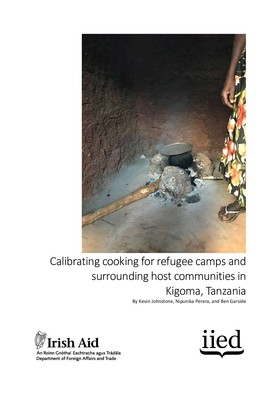Calibrating cooking for refugee camps and surrounding host communities in Tanzania

Cooking activities, deforestation and sexual and gender-based violence (SGBV) are dynamics that closely interact in displacement settings across the globe. Indeed, most refugees and asylum seekers – referred to as persons of concern (POCs) for the purpose of this study – rely on woodfuel to cook food that is usually sourced from areas surrounding their camps. The time and distance to harvest the woodfuel is frequently measured in hours per week and the work is gruelling. This labour typically falls on the shoulders of women and girls, which leaves them open to protection risks such as violence and rape as they source wood outside of the camps for long periods. Harvesting woodfuel can also contribute to deforestation as camps are usually densely packed, which leads to unsustainable harvesting from surrounding forest areas.
This study reviews the feasibility of possible solutions to address the cooking fuel needs of refugees and local communities in Kigoma.
Cite this publication
Available at https://www.iied.org/22121g
